SUMMARY
This is AI generated summarization, which may have errors. For context, always refer to the full article.
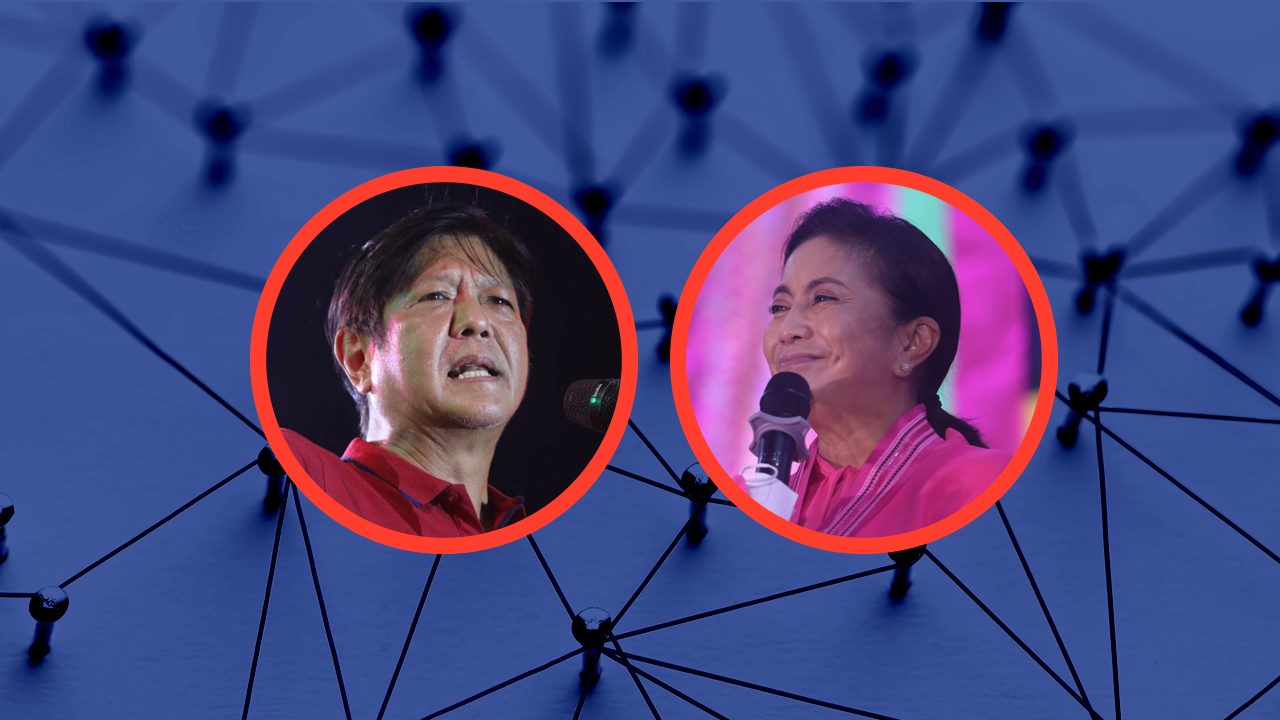
This story was made in collaboration with data consultancy TheNerve.
MANILA, Philippines – On social media, former senator Ferdinand “Bongbong” Marcos Jr. and Vice President Leni Robredo are going head-to-head for the presidency.
It’s a two-way race between the consistent top 2 in the pre-election surveys in terms of reach and popularity on Facebook, Twitter, and TikTok. But unlike field surveys where Marcos Jr. enjoys a wide lead over Robredo, the race appears to be tighter on social media.
As the Philippines moves to elect a new leader in 2022, Rappler and Manila-based data consultancy Nerve looked at how the candidates and their supporters have utilized social media for their campaigns. The data showed that Marcos Jr. and Robredo dominated conversations on social media, while the other eight candidates trailed far behind.
Below is a summary of the findings. For the full report, read this Rappler+ exclusive: On social media, it’s a two-way presidential race between Marcos, Robredo
Facebook: Well-coordinated vs volunteer-driven
Robredo slightly leads over Marcos Jr. in terms of total mentions on Facebook, but her lead doesn’t necessarily mean that she’s winning on the platform since not all of the conversations about her were coming from pro-Robredo communities.
Marcos Jr. still has the most well-coordinated network on Facebook among all of the candidates. His community operates in a vacuum, effectively drowning out content from sources other than those supportive of him.
The big proportion of supporters in Marcos Jr.’s network indicates that the years-long information operations online have successfully created a massive echo chamber of Marcos family supporters.
But the growth of Robredo’s volunteer-driven network on the platform is trying to challenge this.
The strategy of the Robredo community on Facebook appeared to be funneling content to more neutral spaces, in order to reach new people and cross boundaries. Robredo is able to rely on content from mainstream news organizations, making her network’s content sources more diverse.
Instead of a large cluster of supporters like Marcos Jr.’s, Robredo’s network shows a huge presence within shared communities, which reflects efforts to penetrate spaces that they share with other candidates’ supporters – likely an attempt to reach out and convert.
Robredo on Twitter, Marcos on TikTok
Robredo is winning by a mile on Twitter. Election-related conversations on Twitter are largely from pro-Robredo communities.
On Twitter, the accounts found in the scan were grouped into clusters based on the similarity of the accounts they follow. Graphika’s data showed that the pro-Robredo cluster (21.4%) is bigger than the pro-Marcos (7.62%) and pro-Duterte (9.16%) clusters combined.
The Marcos network has been trying to penetrate Twitter using freshly-made accounts to push pro-Marcos propaganda similar to what’s rampant on Facebook, but this has been unsuccessful so far.
Still, although Robredo exhibited a wide lead on Twitter over Marcos Jr. and other candidates, there are only 10.5 million users on the platform as of early 2022, according to We Are Social. This is far from the number of Facebook users in the country at 83.85 million.
Meanwhile, Marcos Jr. dominates TikTok, which has 35.96 million users in the Philippines as of early 2022. It has emerged as a key social media platform as more election-related videos were posted on the platform in the lead-up to May 2022. It also has increasingly become an avenue for disinformation.
Was Robredo able to build her volunteer-driven network big and fast enough to break through Marcos’ seemingly impenetrable walls? Ultimately, the results of the 2022 elections will decide if Robredo’s more organic approach to campaigning has successfully caught up with and broken down Marcos Jr.’s massive army of supporters – both online and offline. – Rappler.com
This study was made in collaboration with TheNerve, a Manila-based consultancy that specializes in analyzing data to bring forth powerful insights and narratives. Believing that data can deliver real-world impact, the company enables its partners across a wide range of industries to cut through the clutter and extract value and meaning from various datasets. The insights guide partners’ business decisions and help them engage with their communities better. Composed of a team of data scientists, business strategists, award-winning storytellers, and designers, the company is on a mission to transform data science into data relevance.
Add a comment
How does this make you feel?
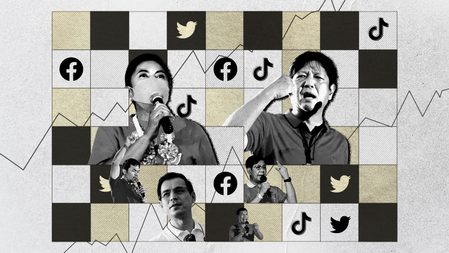


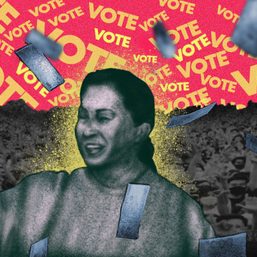
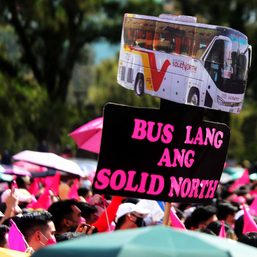
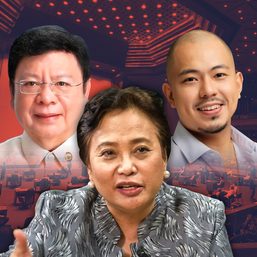


![[New School] Tama na kayo](https://www.rappler.com/tachyon/2024/02/new-school-tama-na-kayo-feb-6-2024.jpg?resize=257%2C257&crop=290px%2C0px%2C720px%2C720px)
![[Only IN Hollywood] After a thousand cuts, and so it begins for Ramona Diaz and Maria Ressa](https://www.rappler.com/tachyon/2024/02/Leni-18.jpg?resize=257%2C257&crop=262px%2C0px%2C720px%2C720px)
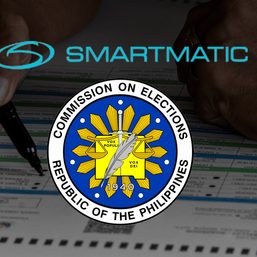

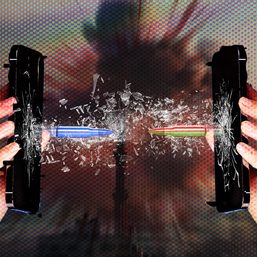

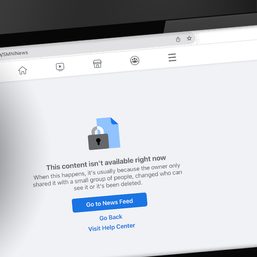
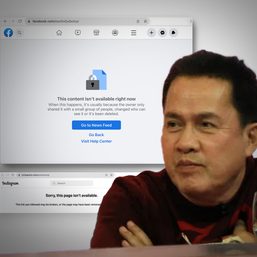
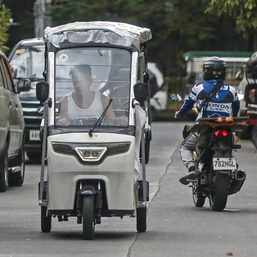
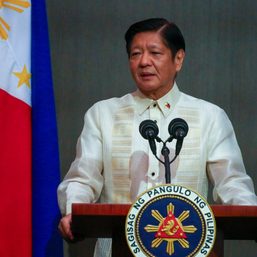
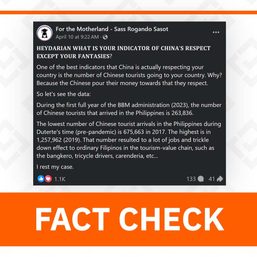
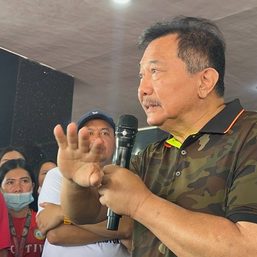
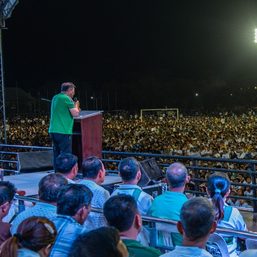
![[OPINION] Sara Duterte: Will she do a Binay or a Robredo?](https://www.rappler.com/tachyon/2024/03/tl-sara-duterte-will-do-binay-or-robredo-March-15-2024.jpg?resize=257%2C257&crop_strategy=attention)
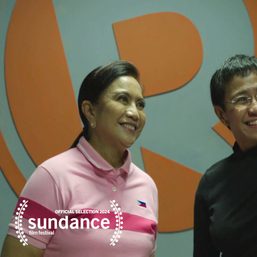
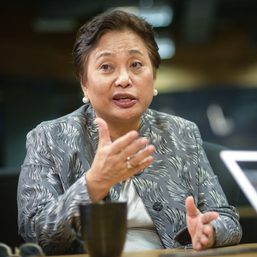


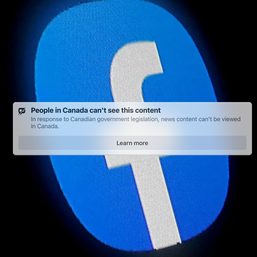
![[OPINYON] Takoyaki tattoo at ang business model ng pang-iinis](https://www.rappler.com/tachyon/2024/04/20240410-Takoyaki-tattoo.jpg?resize=257%2C257&crop_strategy=attention)
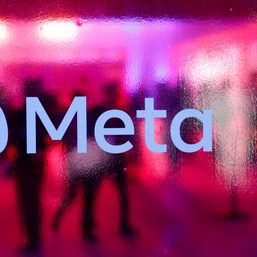
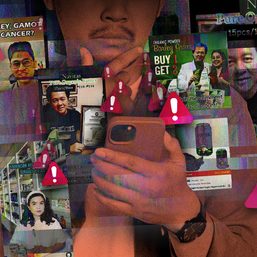
There are no comments yet. Add your comment to start the conversation.